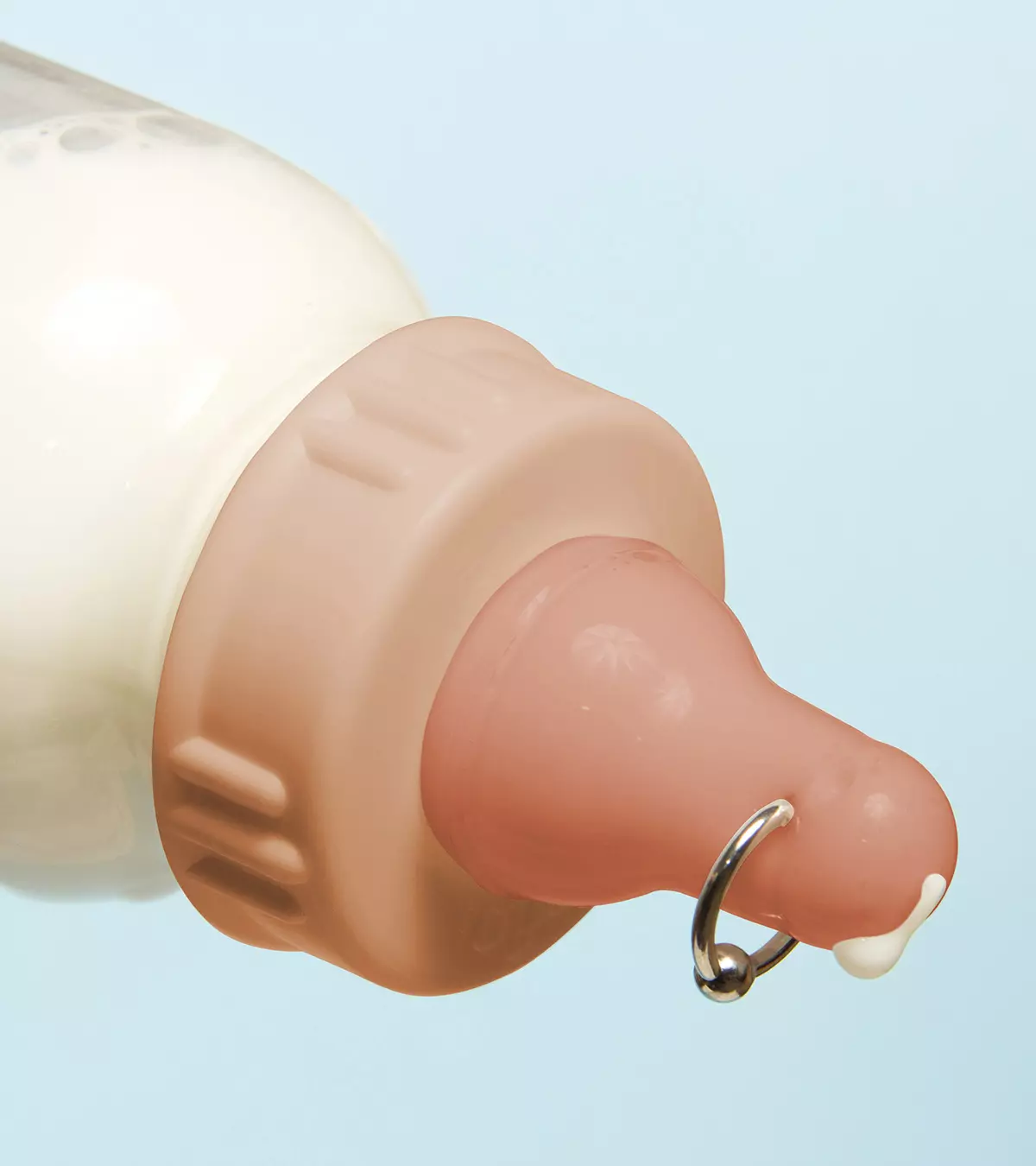
Image: iStock
The medication Prozac while breastfeeding is known to treat postpartum depression (PPD), a physical, emotional, and behavioral change that pregnant women experience after the delivery of a newborn (1). For example, a mother may feel tired, exhausted, irritated, and anxious about taking care of their child. As a result, she may seek escape from the responsibilities of a newborn. However, this temporary change can be treated with some medications and tips. The most commonly suggested by medical professionals to treat PPD is Prozac. However, a few mothers may hesitate to take medications while nursing due to the possible effects on the baby. In this post, we answer this query and discuss Prozac, its usage, and its effects on breastfeeding. We have also included a few natural remedies to help deal with PPD.

Key Pointers
- Prozac is used to treat postpartum depression in women after childbirth.
- A small dose of Prozac is considered safe during breastfeeding to treat depression or panic disorder.
- Stick to the prescribed dose of Prozac and avoid combining it with other medications to prevent complications.
- Common side effects of Prozac include sweating, anxiety, abnormal dreams, nervousness, dry mouth, and nausea.
- Depression can also be managed without medication by maintaining a healthy diet, seeking professional and family support, and practicing stress-relieving techniques.
What Is Prozac?
Doctors often prescribe Prozac to treat severe depression and anxiety. The medication may benefit those experiencing obsessive compulsive disordersiA mental disorder in which individuals experience recurrent, undesirable ideas, thoughts, or sensations. (OCD) and eating disorders such as bulimiaiAn eating disorder that allows you to quickly overeat and purge the food by vomiting or using laxatives. and anorexiaiAn eating disorder characterized by severe food restriction and an intense fear of putting on weight. (2) (3). The generic name of the medicine is fluoxetine. This psychotropic drug belongs to the popular class of antidepressants, or Selective Serotonin Reuptake Inhibitors (SSRI) (2).
Norfluoxetine is the long-acting, active metabolite of Fluoxetine. Apart from Prozac, other fluoxetine drugs include Symbyax, Prozac Weekly, Sarafem, Selfemra, and Rapiflux (2) (4).
Is Prozac Safe While Breastfeeding?
You may take a low dosage of Prozac to deal with depression or panic disorder after childbirth. However, monitor any changes in the behavior of your infant.
Sara Reichling, a mother and blogger, shares her postpartum experience and decision to take Prozac after giving birth to her baby, Elle. She says, “I was a high risk for PPD due to my own history with depression. I knew it might come-a-calling but I didn’t know how intense it would be. It is no joke. I was barely able to care for Elle and I wasn’t enjoying it at all. The Prozac has really helped (i).”
The average amount of Prozac that mixes with your breastmilk is relatively higher than other SSRIs (5). Hence, most doctors recommend Paxil or Zoloft while breastfeeding instead of Prozac.
Now, what does research say about the safety of Prozac while breastfeeding?
Researchers at the Yale University School of Medicine studied 11 mother-infant pairs when the mothers were on 20 to 40mg of fluoxetine on a daily basis. The study has concluded that there are “no meaningful changes” in platelet 5-hydroxytryptamine receptors (5-HT) transport in infants (6).
The lead author of the study, and assistant professor of psychiatry and obstetrics and gynecology at Yale School of Medicine, Neill Epperson says: “Ten of the 11 infants experienced little or no decline in blood serotonin concentrations after exposure to fluoxetine through breast milk.”
Serotonin is a chemical produced in the brain and is said to influence mood, appetite, sleep and other behavioral issues (7).
Doctors could detect the drug in the serum of breastfed infants. However, less than 10% of the drug found in the mother’s blood gets into the breastfed baby.
Talk to your doctor about some safer alternatives to fluoxetine.
 Quick fact
Quick factSafety Tips
When considering the use of Prozac during breastfeeding, it’s essential to prioritize both maternal mental health and infant safety. Here are some key safety tips and considerations (2) (9):
- Stick to the prescribed dosage of Prozac during breastfeeding.
- Do not take SSRIs or other antidepressants in conjunction with any other drug, as it could lead to complications during lactation.
- Avoid conventional medicines such as anticonvulsants, theophylline-containing drugs, anti-reflux medication, and lithium, while taking fluoxetine and breastfeeding.
- St. John’s wort and tryptophan can interact with fluoxetine. Do not take these without your doctor’s approval.
- Watch for signs of irritability, poor feeding, or sleep disturbances in your baby, and report any concerns to your pediatrician promptly.
- Fluoxetine can make you drowsy or affect your thinking and coordination. Hence, refrain from using heavy machinery or driving a vehicle until you know how it affects you.
- Do not consume alcohol while taking fluoxetine, as it increases drowsiness.
 Point to consider
Point to considerSide Effects Of Taking Prozac While Breastfeeding
Common side effects in mothers are: sweating, anxiety, abnormal dreams, nervousness, dry mouth and nausea (2). Some other side effects are:
- Vomiting
- ColiciFrequent, prolonged, and intense periods of crying in a healthy baby without any apparent reason
- Decreased sleep
- Irritability
- Decrease in weight
- Diarrhea
In the Yale study, out of the 11 infants, only in one a decline in platelet 5-HT, coupled with measurable plasma fluoxetine level was seen. Researchers assume that this was due to the exclusive breastfeeding by the mother, who was on high plasma drug level.
“However, the observations may be coincidental, and the infant experienced no discernible adverse effects,” the report says.
Another study that measured the weight gain in infants when the mothers were on fluoxetine, observed reduced growth in the babies (10). This could be of concern in babies who are already having a low weight gain.
Both the study reports agree that further research is required to determine the adverse effects of SSRIs.
These observations could raise doubts or risks of whether or not to use Prozac when breastfeeding.
 Things to know
Things to knowShould The Mother Stop Breastfeeding When Taking Prozac?
The drug gets to its peak in the breast milk around the first eight hours of ingestion (11). But you don’t need to discontinue breastfeeding.
However, monitor the infant’s health for fussiness, colic, or sedation. Also, measure his weight regularly to make sure that he is growing normally. You can also take your medication after breastfeeding to reduce drug levels in milk at the next feeding. If needed, discuss alternative medications with your doctor that may have lower breast milk transfer.
Natural Ways To Get Rid Of Postpartum Depression
Based on a report from the US Centers for Disease Control and Prevention (CDC), it has been determined that approximately 13.2% of American women who have recently given birth experience postpartum depressive symptoms (12). Overcome your depression with some support from non-medical ways:
- Maintain a healthy diet and get enough rest.
- Practice relaxation exercises or go for a walk in the park.
- Speak and share your feelings with your partner or close friends and family.
- Try stress-relieving techniques such as yoga, meditation, and good music.
- Consider engaging in community support groups or seeking therapy, as these resources can provide emotional support and coping strategies.
- Online forums and local organizations often offer valuable connections for new mothers facing similar challenges.
Frequently Asked Questions
1. Can depression affect your milk supply?
Maternal mental health issues such as stress and anxiety may increase levels of certain hormones such as cortisol and affect your milk supply (13). Postpartum depression (PPD) additionally interferes with breastfeeding. Women with unaddressed PPD may not breastfeed or do it for shorter durations than women who are not clinically depressed. PPD may also affect the immune properties of breast milk (14).
2. Can Prozac decrease milk supply?
Women on Prozac may encounter a delayed onset of milk production, which may cause initial feeding difficulties. However, this delay did not significantly impact their feeding (5).
3. How does Prozac make me feel when I start taking it?
Antidepressants, including Prozac (fluoxetine), can help you feel happier, sleep better, and feel less stressed once you start taking them. However, it may take a few weeks to experience the results (8).
4. What are the alternatives to Prozac while breastfeeding?
Certain antidepressants, such as Zoloft (sertraline) and Paxil (paroxetine), are considered safer alternatives during breastfeeding. Always consult with a healthcare provider to determine the best option tailored to individual needs.
Any medication such as Prozac while breastfeeding may raise concerns for your baby’s health. Since you undergo several physical and emotional changes postpartum, you may be prescribed medications and therapy. However, as said by professor Epperson, before taking fluoxetine medicines and SSRIs, women should “weigh a range of factors, including the severity of the postpartum depression, their response to the anti-depressants, and their commitment to breastfeeding.” Therefore staying aware of the drug and consulting your doctor about safer alternatives provides better management.
Infographic: Adverse Effects Of Prozac On Mother And Breastfeeding Baby
Breastfeeding is the phase when you need to be extra careful about the medicines you consume since they may pass on to the baby through breast milk. While Prozac may help reduce postpartum depression, you must watch out for its side effects. The infographic below shares the potential side effects of Prozac on the mother and the baby.
Some thing wrong with infographic shortcode. please verify shortcode syntax
Illustration: Is It Safe To Take Prozac While Breastfeeding?

Image: Dalle E/MomJunction Design Team
Prozac (Fluoxetine) is a powerful medication, but it can have side effects. Watch this video to learn more before you start taking it.
Personal Experience: Source
MomJunction articles include first-hand experiences to provide you with better insights through real-life narratives. Here are the sources of personal accounts referenced in this article.
i. Celebrating 12 weeks.;https://sarareichling.wordpress.com/2013/11/06/celebrating-12-weeks/
References
- First postpartum depression pill approved by FDA: What to know.
https://utswmed.org/medblog/postpartum-depression-pill/#:~:text=How%20does%20the%20PPD%20pill - Fluoxetine.
https://medlineplus.gov/druginfo/meds/a689006.html - Sarah-Catherine Rodan et.al; (2025); Pharmacotherapy alternative and adjunctive therapies for eating disorders: findings from a rapid review.
https://pmc.ncbi.nlm.nih.gov/articles/PMC10327007/ - Fluoxetine.
https://pubchem.ncbi.nlm.nih.gov/compound/Fluoxetine - Fluoxetine.
https://www.ncbi.nlm.nih.gov/books/NBK501186/ - Maternal Fluoxetine Treatment in the Postpartum Period: Effects on Platelet.
https://e-lactancia.org/media/papers/FluoxetinaBF-Pediatrics2003.pdf - Breastfed Infants Show Little Effect when Moms Take Anti-Depressant.
https://news.yale.edu/2003/11/24/breastfed-infants-show-little-effect-when-moms-take-anti-depressant - Common questions about fluoxetine.
https://www.nhs.uk/medicines/fluoxetine-prozac/common-questions-about-fluoxetine/ - Fluoxetine.
https://www.ncbi.nlm.nih.gov/books/NBK459223/ - C D Chambers et.al; (1999); Weight gain in infants breastfed by mothers who take fluoxetine.
https://pubmed.ncbi.nlm.nih.gov/10545587/ - V Hendrick et.al; (2001); Fluoxetine and norfluoxetine concentrations in nursing infants and breast milk.
https://pubmed.ncbi.nlm.nih.gov/11720696/ - Vital Signs: Postpartum Depressive Symptoms and Provider Discussions About Perinatal Depression — United States
2018. - 4 factors that can decrease breast milk supply – and how to replenish it.
https://utswmed.org/medblog/decrease-breast-milk-supply/ - Psychological Distress in the Mother May Affect Levels of Immunoglobulins in Breast Milk.
https://womensmentalhealth.org/posts/psychological-distress-mother-may-affect-levels-immunoglobulins-breast-milk/
Community Experiences
Join the conversation and become a part of our nurturing community! Share your stories, experiences, and insights to connect with fellow parents.
Read full bio of Dr. Dur Afshar Agha
Read full bio of Shivali Karande
Read full bio of Rohit Garoo
Read full bio of Vidya Tadapatri

















